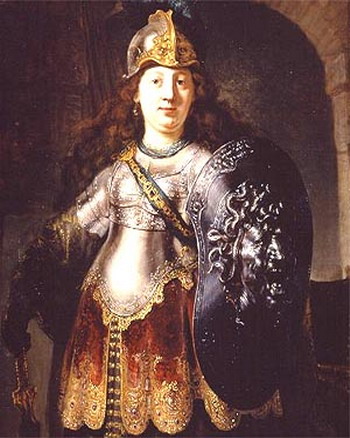return to Home Page
or move on to Goddess Britomartis, next chronologically,
or use Her Cyclopedia Index
Bellona, `Lady-of-War'.
B]LON1
Alternatemeaning: `War-Queen'.
[to Whom the sixteenth day of April, day 106, is dedicated]

Geography/Culture: Roman.
Linguistic notes: Perhaps from Latin, bellum, `war'. Perhaps, like Sumerian Belili Her name is ultimately related to Slavic beli, white, and that to Latin bellus, `beautiful'. The Goidelic bile, means sacred tree; Mediaeval Latin billa and bil-lus, branch, trunk of tree. Related English words: belicose, belligerent, billet.
Description: Warrior Goddess of battles and wars.
To Whom is sacred: {deadly-nightshade atropa belladonna}.
Icon: with helmet, shield and spear.
Festival: June 3rd.
Male associate: brother/consort/son or friend, Mars, or Quirinus (which is also a surname of Mars). Sometimes She is called his Daughter.
- Perhaps related to Belisama, B]LYS*MÔ, `Most-brilliant'. Roman-British, title of: Minerva in Britain, qv Brigit.
- Identified with: Enyo, below.
- Identified with Cappadocian Ma, (below), by Roman soldiers.
- Title: Mah, below.
- Nerio, ----, has Mars for a consort, and so perhaps may be identified with Bellona, .
- Identified with V acuna, see Victoria.
Source: GRA.WG/73; H,g. HCM/50; Kravitz WWGRM.
Enyo, `Warrior'.
]NYO
Alternatemeaning: `Horror'.
Geography/Culture: Greek.
Etymology: \greek}Enu^^w^'. Enyo is probably a dimunition of Mah Enyo (see below Ma-Enyo) Who was also probably called Ma since the Romans identified Ma with Bellona.
Goddess of war and waster of cities; She Who always dresses in yellow.
Male associate: She sometimes accompanied Ares into battle. Also associated with Deimos and Phobos.
- See also Aruru.
- Identified with Roman Bellona.
- Perhaps related to Cappadoncian Ma-Enyo, below.
- An aspect of Triple Graiae, `Grey-ones', qv.
Source: Monaghan BGH 122; PCMD.
Ma, Mother.
M*
Geography/Culture: Asia Minor. [Cappadocian].
Introduced into Rome 85 BC by Sulla.
Goddess of fruitfulness.
- Identified with Cybele.
- It has been said that Ephesaia, She-Whose-Court-is-Hightest, has much in common with Ma, Mother, see also Compiler's Notes, below.
- Perhaps the same as Ma-Enyo, ----.
- Perhaps var: Mama.
- Perhaps var: Mami.
- Perhaps var: Mamitu.
- Perhaps alternate name for Sumerian Aruru, Bright-mother-of-the-hollow, if Ma and Mami are distinguished).
- As creatrix Bau, , Who is linked with Gula-Bau, , is identified with Ma, Mother.
Source: NLEM/220.
Ma-Enyo, {Mother-Warrior}.
M*-]NYO
Geography/Culture: Asia-minor. Cappadocia.
She had a great temple at Comana, with periodic festivals, sacred prostitutes and temple attendants of great renown in the ancient world. Cappadocian Ma was introduced into Rome 85 BC by Sulla.
Description: Great nature Goddess; Great Mother.
Probably Mother Goddess of the Hittites {Wurusemu?}.
To whom are sacred: Hieroduli (temple servants -- She had thousands of them).
- Her worship became popular among the Roman soldiers who identified Her with Bellona.
- Identified with Phrygian Cybele, She-With-the-Axe, qv.
- Ephesaia, She-Whose-Court-is-Highest, qv, is said to have much in common with Ma, .
- Perhaps the same as Mah, below.
- Some say also called Mah-Enyo, i.e. perhaps a variant.
- Probably etymologically related to Greek Enyo, above.
- Perhaps etymologically related to Finish Maan-Eno, qv Rauni.
Mah, Great-Goddess.
M*
Alternatemeaning: Mother.
Geography/Culture: Hittite, Cappadocian.
Decription: Great Goddess; Presider over procreation and childbirth; Determiner of destinies; She Who ensures the regeneration of nature by awakening the sexual energies in spring: Goddess of war (Defender of Her people).
In Mazdaism, Mah, the Moon, (perhaps male) is an assistant of Vohu Manah, and presides over the phases of time and the movements of waters (tides).
- Title of Bellona, Lady-of-Wat, after Roman assimilation of Mah, Great-Goddess.
- Perhaps known to the Romans as Cappadocia, K1P1DOKY1, ----, at anyrate Cappadocia is the geographical personification of Cappadocia.
- The name Hannahannas, Grandmother, is, so a source tells me, "ideologically written Mah". I just don't know what ideological means in this instance!
- Probable variant of Ma, Mother, above.
- Perhaps variant Mami.
- Perhaps short form of Sumerian Nin-Ma, Great-Lady.
- Identified explicitly with Nin-Tu, qv Dam-Kina.
Sources: BGH/45; HDH/186; LWM/192; MAW.SNK/122; T.THG/274, 286; GRARE/9. Sources: H,G.HCM/50; PCMD.
Compiler's Notes: I have yet to unravel the confusion of Ma, Mah, Ma-Enyo, and Mah-Enyo. Perhaps the benevolent Ma, as Goddess of fruitfulness and childbirth, associated with Sumerian Aruru, and perhaps a title of Hers, became belligerent; took up battle in defense of Her people, and was then surnamed Enyo, (which is Greek at least, apparently means Warrior.
I wish I was linguist enough that I might peruse the etymological dictionaries of a particular culture's language. Is there a real relationship between war and beauty -- certainly between love and war, but is love, beauty? The difference between suffixes tantalises. If bell is isolated -- relating itself thereby to "the bell that tolls", "la belle dame sans merci", the bell shape of a flower, and so on, and -ona means, as according to Graves it does, 'Queen', then, plus 'bell' interpreted generously, Bellona could be translated as `Beautiful-queen', and that meaning has to remain potential even when recognising the suffix -adon (in the variant Belladona) as possibly meaning 'Our-teacher', as in the Welsh word 'Don', who could be a teacher of the beauty of art, in this case the art of bellum, conceived of as the art of killing? Billets of wood (in the form of substantial branches, and later enhancements) encouraging the belting of skulls in an, enviably, increasingly sophisticated manner. And still it seems possible to read: Profoundly-sorrowful-bread-baker.
In such folk-literate manner, I offer deadly nightshade, as an appropriately sacred plant for Her, Bellona, Lady-of-War, loosely understanding the Latin Atropos Bella-donna to mean the old wise woman who cuts life off. FW.
worked on: September, May 1995; August 1991; July 1990.
Return to the top of this document.
